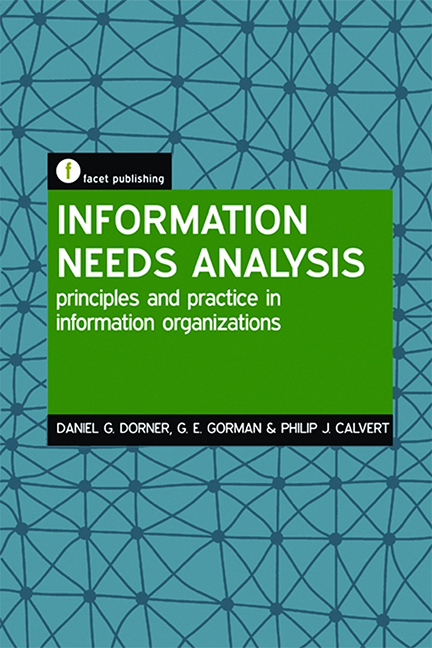Book contents
- Frontmatter
- Contents
- List of figures and tables
- List of scenarios
- About the authors
- Preface
- 1 Background to needs analysis for information managers
- 2 The importance of context in information needs analysis
- 3 Models and types of information needs analysis
- 4 The stages of information needs analysis
- 5 Gathering data for information needs analyses
- 6 Gathering data from existing sources
- 7 Gathering data through surveys
- 8 Gathering data through interviews
- 9 Analysing and integrating information needs analysis data
- 10 Reporting on an information needs analysis
- Bibliography
- Index
Preface
Published online by Cambridge University Press: 10 September 2022
- Frontmatter
- Contents
- List of figures and tables
- List of scenarios
- About the authors
- Preface
- 1 Background to needs analysis for information managers
- 2 The importance of context in information needs analysis
- 3 Models and types of information needs analysis
- 4 The stages of information needs analysis
- 5 Gathering data for information needs analyses
- 6 Gathering data from existing sources
- 7 Gathering data through surveys
- 8 Gathering data through interviews
- 9 Analysing and integrating information needs analysis data
- 10 Reporting on an information needs analysis
- Bibliography
- Index
Summary
What can be uttered in a word but contemplated forever? What do fools ignore and pragmatists suffer? What is evaluation's greatest challenge? These questions present no riddle, no mystery, and no conundrum. The answers are: complexity, complexity and complexity. Every attempt to conduct an evaluation is beset with the impossibility of covering every angle; every attempt to conduct a review is faced with the impracticability of chasing down every single issue.
(Pawson, 2013, 29)Pawson wails, ‘complexity, complexity, complexity’, in relation to evaluation, but he could just as well be speaking of information needs analysis (INA). For some reason the common view among information professionals is that INA is a mysteriously complex undertaking. Perhaps this is because they lack experience in this type of applied investigation; as in almost any endeavour, lack of experience makes something seem more daunting than it actually is. If in contrast information workers see INA as simple and straightforward, they lack INA experience, or perhaps see it as something related just to information literacy. In reality INA is neither more complex nor simpler than any other kind of investigation in the social sciences. But the aura of complexity remains the standard view of INA, and this has been a key motivation for writing this book. In the book we seek to show that, with a step-by-step approach to the theory, process and procedures of INA, readers will understand that it is a straightforward type of applied research with information in a variety of information contexts as its focus. In other words INA is not necessarily the complex beast that many assume it to be.
A second motivation for this book is a desire to help our readers better realize that INA is ubiquitous in society and that it is not the preserve of information professionals or information organizations. In the information-rich developed world, where the majority enjoy ready and rapid access to information, it is essential to understand that we are all engaged in INA at some level, and that if we are not, then we are the poorer for it in our professional, social and private lives.
- Type
- Chapter
- Information
- Information Needs AnalysisPrinciples and Practice in Information Organizations, pp. xiii - xviiiPublisher: FacetPrint publication year: 2017



